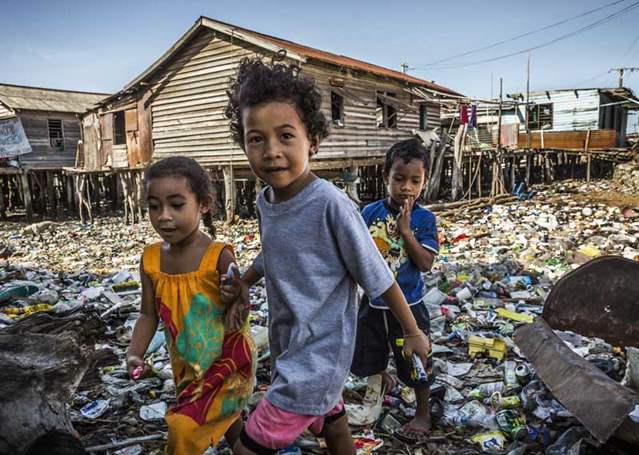Overview
In the midst of plenty, many people still go hungry, live in poor housing without basic services such as water and toilets and grow-up without education.
This is not just because of a lack of resources, but also because of negligence and discrimination. Governments are simply unwilling to do something about it. This is not an unfortunate reality of life, it is a shocking human rights scandal.
Amnesty is working with communities across the world, equipping residents with the knowledge and tools to engage with government officials to claim their rights and improve their lives. We have developed close partnerships with local activists like John Kamau.
John Kamau runs a small hotel business in the Deep Sea community in Nairobi, Kenya, and has six children. “If demotion takes place here, I have no place to go. My children will have to leave school… We are treated as animals. I have joined a group in the village known as the Rapid Response team. We phone each other, we do networking in this village and others to search for the truth and establish how to start a campaign.”

The problem
People living in poverty are often trapped because they are excluded from the rest of society, denied a say, and threatened with violence and insecurity.
Rights are the key for people to break out of the poverty trap. Put simply, respect for human rights demands inclusion, demands that everyone gets a say, demands that those in power protect people from threats to their security.
Housing
We all have the right to housing, yet over 10% of people worldwide live in a slum or informal settlement. Living conditions are often dire with overcrowding, little or no access to clean water, toilets or healthcare. Many people living in slums or informal settlements are not protected from harassment such as forced evictions because their right to live there is not legally recognized.
Forced evictions are when people are removed from their homes and lands without advance notice, consultation and compensation. They are illegal and violate the right to housing. Often forced evictions are violent, destroy livelihoods and make people homeless.
Health
The things that help keep us healthy – safe water, nutritious food, housing and information, such as sex education – are often absent or limited for people living in slums and informal settlements. And when people do get ill, they rarely have access to adequate health care.
We all have the right to be as healthy as we can possibly be – both mentally and physically. This doesn’t mean we have the right to be healthy – no one can have perfect health all the time. It means that we should all be able to access health care and information regardless of who we are, where we live or how well-off we are. And, importantly, it means we all have the right to make decisions about our own body and health.
Education
Primary education should be free, and compulsory, everywhere. Children need to be able to get to school without walking for hours, or through minefields. They should be able to learn and enjoy school life. Yet time and again, children from poor and marginalized communities are denied an education or experience discrimination.
What is Amnesty calling for
Governments should
• Guarantee all economic, social, and cultural rights without discrimination.
• Better prioritize how they spend money – putting the most disadvantaged first.
• Prioritise minimum essential levels of rights, such as free primary education.
• Stop evicting people from their homes without proper advance notice, compensation or consultation.
• Sign and ratify the Optional Protocol to the Covenant on Economic, Social and Cultural Rights.
• Make sure that economic development projects (such as infrastructure or mining), help the most disadvantaged and do not lead to human rights abuses.
The issue in detail
Justice
Many of the issues around poverty are known as “economic, social and cultural” (ESC) rights. They include:
• Rights at work, such as fair conditions of employment.
• Right to education, including free and compulsory primary education.
• Cultural rights of minorities and Indigenous Peoples.
• Right to the highest attainable standard of physical and mental health, such as access to quality health services.
• Right to adequate housing, including protection from forced eviction.
• Right to food, including being able to obtain nutritious food.
• Right to water, including affordable clean water.
• Right to sanitation, including access to a safe toilet.
For years it seemed almost impossible to challenge the government if you were denied these rights. Who do you complain to? Who will listen?
In May 2013, the Optional Protocol to the Covenant on Economic, Social and Cultural Rights came into force. As of the end of 2014, 17 countries – from Gabon and Argentina to Spain and Mongolia – had fully accepted this new mechanism that gives people the ability to seek justice from the UN, if their own country won’t listen.
These ‘protocols’ may sound legalistic and irrelevant, but they can have real teeth. The more we use them, the more powerful they will be.

